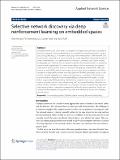Selective network discovery via deep reinforcement learning on embedded spaces
Author(s)
Morales, Peter; Caceres, Rajmonda S; Eliassi-Rad, Tina
Download41109_2021_Article_365.pdf (3.454Mb)
Publisher with Creative Commons License
Publisher with Creative Commons License
Creative Commons Attribution
Terms of use
Metadata
Show full item recordAbstract
Abstract
Complex networks are often either too large for full exploration, partially accessible, or partially observed. Downstream learning tasks on these incomplete networks can produce low quality results. In addition, reducing the incompleteness of the network can be costly and nontrivial. As a result, network discovery algorithms optimized for specific downstream learning tasks given resource collection constraints are of great interest. In this paper, we formulate the task-specific network discovery problem as a sequential decision-making problem. Our downstream task is selective harvesting, the optimal collection of vertices with a particular attribute. We propose a framework, called network actor critic (NAC), which learns a policy and notion of future reward in an offline setting via a deep reinforcement learning algorithm. The NAC paradigm utilizes a task-specific network embedding to reduce the state space complexity. A detailed comparative analysis of popular network embeddings is presented with respect to their role in supporting offline planning. Furthermore, a quantitative study is presented on various synthetic and real benchmarks using NAC and several baselines. We show that offline models of reward and network discovery policies lead to significantly improved performance when compared to competitive online discovery algorithms. Finally, we outline learning regimes where planning is critical in addressing sparse and changing reward signals.
Date issued
2021-03-20Department
Lincoln LaboratoryPublisher
Springer International Publishing
Citation
Applied Network Science. 2021 Mar 20;6(1):24
Version: Final published version